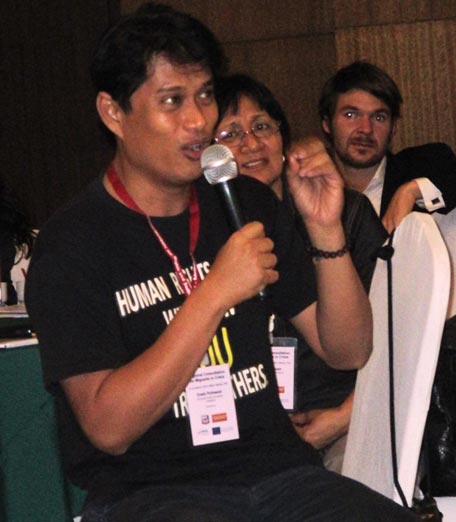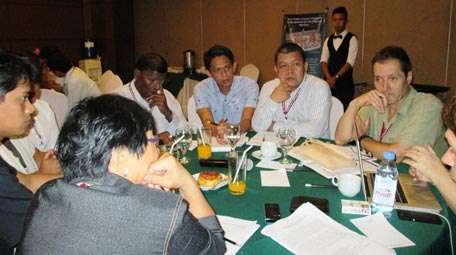- City Fajr Shuruq Duhr Asr Magrib Isha
- Dubai 04:35 05:51 12:21 15:49 18:46 20:03

Participants during the awareness campaign (Supplied)
Heavy borrowings and a lack of saving habit have been blamed for the financial problems the Filipinos are facing in the country and abroad.
Ilmeda M. Nicholas, Chairperson of the Commission on Filipinos Overseas (CFO), said she was shocked to know the high level of financial debt the Filipinos carry in the country and abroad.

William Gois, Regional Coordinator, MFA and Ilmeda M. Nicholas, Chairperson of the Commission on Filipinos Overseas (CFO),highlights migrants in crisis situations.
“Heavy borrowings and lack of prudent saving habits are major problems that we are trying to address through awareness campaigns in all the 20 provinces in the Philippines and among the more than 10 million Filipinos living abroad.
"We have been regularly conducting awareness campaign ‘Peso Sense’ and the ‘Philippines Financial Freedom Campaign’ to improve the financial acumen of both the overseas Filipinos and their families back home,” she said.
Ilmeda advised her countrymen living abroad not to resort to heavy borrowings to meet demands from their family members.

Financial awareness campaigns have been initiated across the UAE also to address the pressing problem that haunts many workers.
Frank Cimafranca, the Philippines Consul General in Dubai, and Grace Relucio Princesa, the Ambassador of the Philippines in the UAE, also highlighted the dangers of high indebtedness.
They said a growing number of Filipinos in the UAE are getting into mounting credit card debt and unpaid loan problems.

The awareness campaigns have been initiated in cooperation with the CFO and the United Nations Development Programme (UNDP) to educate Overseas Filipinos Workers (OFW) and their families about how to spend money sensibly by giving various guidelines for young students belonging to the OFW community, adults, entrepreneurs, homemakers, and professionals.
In 2014, overseas Filipinos remitted $26.93 billion (Dh99 billion) mainly from the US, Saudi Arabia, the United Arab Emirates, Singapore, Japan and Hong Kong. On average, 5,000 Filipinos go abroad for work a day, making an annual outflow of 1.4 million migrant workers.

varrious rights groups under the Migrant Forum Asia jointly discussing pressing problems @Manila
Rose Bayan, a social worker from Kunlagan Center Foundation in the Philippines, said parents who work abroad send money for their children’s wellbeing and education but the guardians or old parents do not give them all the money.
“Sometimes even the father will be wasting the remitted money for liquor or other things, leaving the children strained financially, said Rose.
Student suicides are sometimes reported from various schools and colleges due to financial problems and depression.
Children of OFWs who are enrolled in expensive schools sometimes end up in financial problems when their regular allowances are stopped due to irregular or non-payment of salary in the foreign countries.
Rose, who works with several migrant organisations under the Migrants Forum Asia, told Emirates 24|7 in an interview that the financial burden for OFWs mostly starts from the home country where people borrow from private money lenders at abnormally high interest rate.
She revealed that many poor migrants borrow directly from the recruitment agencies also. As part of a campaign to regulate recruitments, the Migrant Forum in Asia (MFA) has put forward many suggestions to clean up the recruitment process both in the Philippines and foreign countries.
“Schools in most areas are dominated by students from the OFW families who get their allowances from abroad. Some OFW students are living comfortably with all the comforts and gadgets. In many cases, parents send money but the amount is not entirely used for the children.
"Seventy per cent of the amount is spent by the custodians. Both men and women in the remittance dependent regions spend the money lavishly,” said Rose who works among returned migrant woman and children.
CFO Chairperson Ilmedas said the ‘Peso Sense’ campaign focuses on guiding the students, especially of the OFW families enrolled in expensive schools, to keep track of their regular expenses and savings, avoid buying unwanted things and gadgets. They are also advised to recycle the school materials instead of always buying new stuff.
She advised student community must participate in the family’s budget planning/forecasting process and use the spare time creatively to become entrepreneurs.
Meanwhile, another issue that was highlighted during the awareness campaigns and a major drag on the Filipinos’ finances is the addiction to gambling.
“Many OFWs especially with stretched finances feel that they can resolve their financial problems through gambling.
"If you win once, nine times you are bound to fail. I know a well-paid professional OFW who lost one year’s salary in one month’s gambling. His family is in deep financial mess. Instead of resolving their financial problems, gambling intensifies the OFW financial woes,” said Norman Gracias of the Public Services International (PSI), an international trade union group active in a number of countries where OFWs live.
William Gois, Regional Coordinator for MFA, highlighted the problem of high indebtedness among OFWs due to high recruiting rates. A new financial problem facing the OFW professionals stranded in war prone countries like Libya and Yemen.
“Many of the OFWs professionals who used to work with fancy salaries in the oil and gas industry had kept their savings in the local banks.
"Due to the fighting and instability the currency of Libya has depreciated by more than half, wiping out the life savings of many OFWs returning home." The MFA is bringing the OFW problems to the attention of international community and the Philippines Government through various awareness campaigns.
Many Filipinos migrate to solve their problems back home, but now migration is causing new problems of indebtedness and insolvency among OFWs.
![]() Follow Emirates 24|7 on Google News.
Follow Emirates 24|7 on Google News.